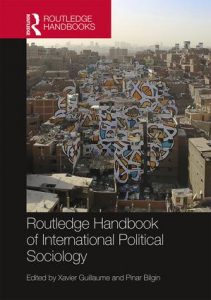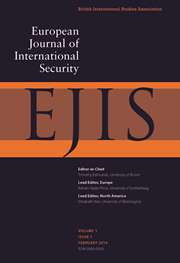In a new op-ed published by The Conversation written with Robert McCabe, we discuss whether the recent hijacking of the ARIS 13 off the coast of Somalia implies a return of piracy. We argue that the incident should be understood as a warning signal and should remind us about the importance of taking the grievances of coastal communities seriously. It is available here.
Category Archives: Publications
Handbook on International Political Sociology published
 The Handbook of International Political Sociology edited by Xavier Guillaume and Pinar Bilgin has been published. The handbook provides a survey through the multi-dimensional field of international political sociology, explores core issues, theories and methods as well as the connections to cognate disciplines. It will become a useful resource for students and scholars and further strengthen the field. In my own chapter I discuss the practice turn and its methodological implications. Preview the book here.
The Handbook of International Political Sociology edited by Xavier Guillaume and Pinar Bilgin has been published. The handbook provides a survey through the multi-dimensional field of international political sociology, explores core issues, theories and methods as well as the connections to cognate disciplines. It will become a useful resource for students and scholars and further strengthen the field. In my own chapter I discuss the practice turn and its methodological implications. Preview the book here.
New edition of Handbook of Security Studies published
 The 2nd edition of the Routledge Handbook of Security Studies has just been published. The 41 chapters give an overview of the stat of the art of Security Studies, discuss theoretical approaches, as well as distinct security challenges. In my contribution to the handbook, titled “Security as Practice”, I introduce and discuss how practice theories have been developed within the sub-discipline. I pay particular attention to theories developed from Bourdieu’s work, the security communities of practice approach, as well as relationalist and actor-network theory inspired work. The pre-print of the chapter is available via my academia page.
The 2nd edition of the Routledge Handbook of Security Studies has just been published. The 41 chapters give an overview of the stat of the art of Security Studies, discuss theoretical approaches, as well as distinct security challenges. In my contribution to the handbook, titled “Security as Practice”, I introduce and discuss how practice theories have been developed within the sub-discipline. I pay particular attention to theories developed from Bourdieu’s work, the security communities of practice approach, as well as relationalist and actor-network theory inspired work. The pre-print of the chapter is available via my academia page.
The Future of the CGPCS: New Blog Post
In a new blog post published with Piracy-Studies.org – The Research Portal for Maritime Security I discuss the future of the Contact Group on Piracy off the Coast of Somalia (CGPCS). The CGPCS is the core global governance mechanism by which the fight against Somali piracy is coordinated and I have studied it extensively in the frame of the CGPCS lessons learned project. In the blog I discuss the advantages and disadvantages of three options that have been articulated by the international community: Extend the work to cover either other regions, or other threats, or further streamline it. Please read the full blog here.
First Issue of European Journal of International Security published
 Today the first issue of the brand new European Journal of International Security (EJIS) went online.
Today the first issue of the brand new European Journal of International Security (EJIS) went online.
EJIS is the new flagship journal of the British International Studies Association published with Cambridge University Press. The editorial team consists of colleagues from the GW4, with Tim Edmunds (Bristol) in the lead. Together we have been working for a year to get the journal up and running. Continue reading
Forum on Practice Turn published
 The forum discussing the future of the practice turn in International Relations has just been published by the International Studies Quarterly (ISQ) Blog and is available here. The forum takes our 2015 ISQ article titled “The Play of International Practice” as the starting point and then centers on the question what the promises of practice theoring in IR are. The forum includes contributions by Emanuel Adler and Vincent Pouliot, Rebecca Adler-Nissen and Ole Jacob Sending as well as a response by Frank Gadinger and me.
The forum discussing the future of the practice turn in International Relations has just been published by the International Studies Quarterly (ISQ) Blog and is available here. The forum takes our 2015 ISQ article titled “The Play of International Practice” as the starting point and then centers on the question what the promises of practice theoring in IR are. The forum includes contributions by Emanuel Adler and Vincent Pouliot, Rebecca Adler-Nissen and Ole Jacob Sending as well as a response by Frank Gadinger and me.
Paper on practice turn in IR now in print.




The core claims of the practice turn in International Relations (IR) remain ambiguous. What promises does international practice theory hold for the field? How does the kind of theorizing it produces differ from existing perspectives? What kind of research agenda does it produce? This article addresses these questions. Drawing on the work of Andreas Reckwitz, we show that practice approaches entail a distinctive view on the drivers of social relations. Practice theories argue against individualistic-interest and norm-based actor models. They situate knowledge in practice rather than “mental frames” or “discourse.” Practice approaches focus on how groups perform their practical activities in world politics to renew and reproduce social order. They therefore overcome familiar dualisms—agents and structures, subjects and objects, and ideational and material—that plague IR theory. Practice theories are a heterogeneous family, but, as we argue, share a range of core commitments. Realizing the promise of the practice turn requires considering the full spectrum of its approaches. However, the field primarily draws on trajectories in international practice theory that emphasize reproduction and hierarchies. It should pay greater attention to practice approaches rooted in pragmatism and that emphasize contingency and change. We conclude with an outline of core challenges that the future agenda of international practice theory must tackle.
New book chapter on ANT available as pre-print
Our introductory text to Actor-Network Theory is available as pre-print. The chapter titled “Actor-Network Theory. Objects and Actants, Narratives and Networks” is authored jointly with Jan Stockbruegger. It is forthcoming in “Technology and World Politics: An Introduction”, edited by Daniel R. McCarthy (Abingdon: Routledge) which is a textbook for advanced graduate students. In the chapter we provide a succinct introduction to Actor Network Theory (ANT) and how it has been discussed in International Relations. Arguing that ANT offers “empirical theory” we review a range of classical ANT studies and discuss what concepts they develop. We continue in exploring what one can “do” with ANT to study international relations and global politics. The chapter is available through my Academia page, and can be accessed here.
‘The Play of International Practice’ now online as first view




“The core claims of the practice turn in International Relations (IR) remain ambiguous. What promises does international practice theory hold for the field? How does the kind of theorizing it produces differ from existing perspectives? What kind of research agenda does it produce? This article addresses these questions. Drawing on the work of Andreas Reckwitz, we show that practice approaches entail a distinctive view on the drivers of social relations. Practice theories argue against individualistic-interest and norm-based actor models. They situate knowledge in practice rather than “mental frames” or “discourse.” Practice approaches focus on how groups perform their practical activities in world politics to renew and reproduce social order. They therefore overcome familiar dualisms—agents and structures, subjects and objects, and ideational and material—that plague IR theory. Practice theories are a heterogeneous family, but, as we argue, share a range of core commitments. Realizing the promise of the practice turn requires considering the full spectrum of its approaches. However, the field primarily draws on trajectories in international practice theory that emphasize reproduction and hierarchies. It should pay greater attention to practice approaches rooted in pragmatism and that emphasize contingency and change. We conclude with an outline of core challenges that the future agenda of international practice theory must tackle.”
From Dusk to Dawn? Maritime Domain Awareness in South East Asia


Here is the abstract:
“Information Sharing and Maritime Domain Awareness (MDA) are at the heart of the contemporary maritime security agenda. The goal of MDA is to develop shared understandings of developments and threats at sea. This provides one of the preconditions for coordination and cooperation between the diverse maritime security agencies. In this seminar, Dr Bueger will present his paper on the organisation of MDA in the South East Asian region. He argues that MDA is not only a technical challenge, but also a social, political and legal one. Three South East Asian MDA and Information Sharing centres will be discussed in light of these challenges. The political and social functions these centres perform in the governance of maritime security in the region will be explored. The conclusion outlines what lessons the South East Asian system suggests for organising MDA in other regions, including the Western Indian Ocean and West Africa and the rise of a cooperative security culture.”
Further information is available on the CIL website. You can download the full draft paper here.